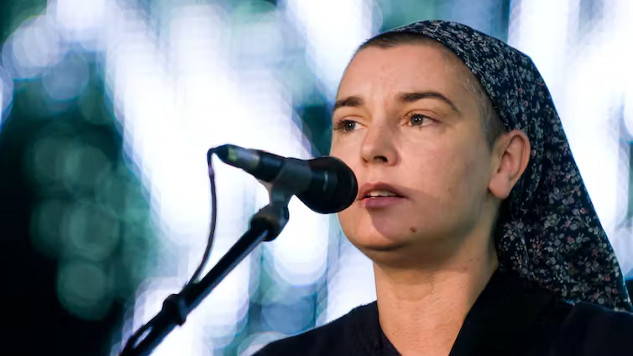The death of Sinéad O'Connor (1966-2023), the Irish, singer-songwriter, performer, activist, actor and memoirist, was announced on July 26, 2023. She is probably most well-known for her cover of the Prince song, Nothing Compares 2 U. The hit transformed her career but there is so much more to her work that, as we commemorate her incredible life, should be remembered.
There’s a magical moment in Rememberings, O'Connor’s 2022 memoir, when she recalls a childhood encounter with her grandmother’s piano. Noticing that the piano seemed “sad”, she asks it why. It answers: “Because I’m haunted” – and asks her to play it.
As the young Sinéad plays, she hears “a lot of voices jumbled together, all whispering”. “Who are they?” she asks. And the piano answers: “History.”
I love how this passage enacts a child’s loving sense of the world’s sheer aliveness, while also giving us a key to O’Connor’s work. That key is “history”: not as in battles, kings or conquests, but history as something sensuous, haunted and in need of care; something we encounter through our bodies – and something that has not ended.
Cover albums
This yearning, tender sense of history animates all of O’Connor’s work – but most vividly her two covers albums, the first of which, Am I Not Your Girl?, was released in 1992.
On this record, O’Connor covers what she described as “songs I grew up listening to [and] that made me want to be a singer”. She does so with a big-band jazz sound and a stunning set of vocal performances.
The album includes covers of Why Don’t You Do Right?, most famously recorded by Peggy Lee in 1942, and of Doris Day’s Secret Love, originally part of the 1953 Calamity Jane musical. But for me, this album’s stand-out moment is O’Connor’s ferociously delicate performance of Loretta Lynn’s 1962 Success.
O’Connor changed the title to Success Has Made a Failure of Our Home, adding (as she explained in her memoir): “Words that were very autobiographical … about what success has done to my life.”
Sean-Nós Nua, the second covers album, released in 2002, digs deeper into the past and lives in a more Irish, folk-oriented tradition. Its most stunning moment is O’Connor’s rendition of the American civil war song, Paddy’s Lament. This is a performance that gives space and energy to the forgotten people of history – in this case, Irish soldiers who were lured into fighting, then left mutilated and destitute at the civil war’s end.
To praise O’Connor as a maker of covers albums, a singer of other people’s songs, is not to denigrate her immense talent as a writer. The best writers (think Virginia Woolf) are always attentive readers, and the best songwriters (think David Bowie) are always attentive listeners, often with uncanny abilities to hear fresh tunes in the songs they cover.
Original hits
Beyond her ability to cover songs in newly resonant ways, O'Connor also wrote her own heart-wrenching and thoughtful music.
The self-penned Jackie, which begins her first album, The Lion and the Cobra (1987), is the most electrifying opening track of any album I have ever heard. Accompanied only by a fuzzy electric guitar, O'Connor’s voice leaps out at the listener, going from a near-whisper to a primal roar as she sings in the voice of a woman “wandering the beach, waiting for the return of someone dead”.
Few songs better embody the feelings of longing, retribution and abandonment that can go with being part of a love story than You Cause as Much Sorrow, from 1990’s I Do Not Want What I Haven’t Got. Similarly, the jumpy joy of the arrival of new love is rendered beautifully in Old Lady, from her 2012 album How About I Be Me (and You Be You)?
If the child O’Connor played her grandmother’s piano in response to a call from the instrument, then much of her self-authored work was a response to a call from the otherwise silenced. This is certainly the case with Famine, from 1994’s Universal Mother.
This track addresses the legacies of the Irish potato famines of the 1840s. It’s a rap-based piece with its own theory of history as something which can be stolen and something, consequently, for which people can long. The “they” O'Connor raps about is the British authorities governing 19th-century Ireland:
They gave us money not to teach our children Irish
And so we lost our history
And this is what I think is still hurting me
Famine’s chorus consists of a few lines from the Beatles’ Eleanor Rigby:
All the lonely people
Where do they all come from?
All the lonely people
Where do they all belong?
The reimagining of a song by someone else is central to O'Connor’s mission – in this case, the most disturbing track from what she described in her memoir as “the most special album I have ever made”.
Very little of what O’Connor addresses on Famine – the mutually formative relationships between political violence, intergenerational trauma, addiction and child-abuse – would strike anyone in 2023 as being particularly novel. But in this 1994 track, she was a trailblazer in using her passions and gifts – her love of rap music, that heart-stopping voice, her tender sense of the past – to help us with the work of hearing history.
About The Author
Denis Flannery, Associate Professor in American Literature, University of Leeds
This article is republished from The Conversation under a Creative Commons license. Read the original article.


























